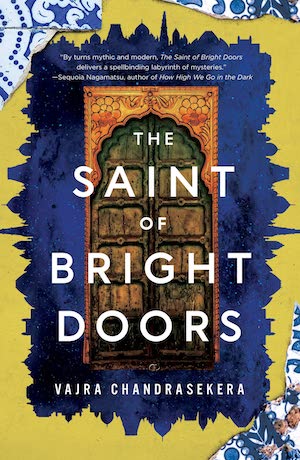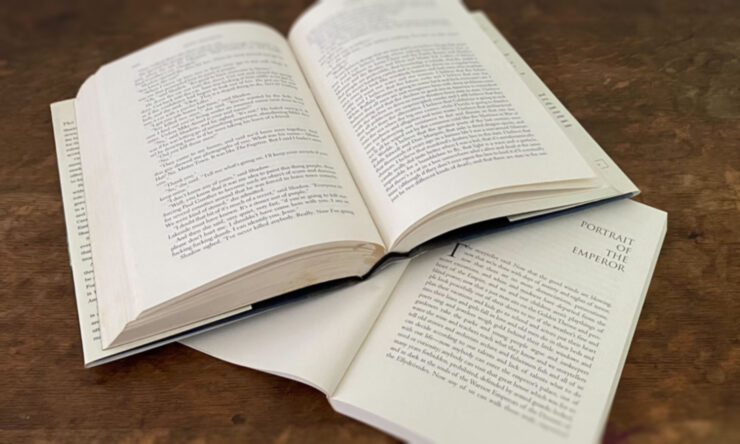The first sentence of Angélica Gorodischer’s Kalpa Imperial is more than 200 words long. Two hundred and seventeen, if my hasty count is correct. I’ve had writing assignments meant to cover entire movies or concerts that were shorter than that. And there is more to that single paragraph—in the edition translated by Ursula K. Le Guin—before the writer moves on to the next thought, the next indent.
I think about this paragraph, with its one epic sentence, a lot. And I’ve been thinking about it more since an online event a few months ago during which the interviewer asked Kelly Link if there were any questions she wished people would ask her. Link said, after thinking for a moment, that she would like to talk about paragraphs. That she had questions about paragraphs.
And all of a sudden, so did I.
Favorite books are common; favorite sentences perhaps a bit less so, but there are plenty of memorable ones. I might even, if pressed, come up with a favorite chapter. But a paragraph? This sturdy, flexible building block of writing? What even is one? Do you think about them when you read? Do you think about them differently online and on the printed page? Do you wonder why they break when they do, or go on at great length?
It is difficult, when one assigns oneself the task of writing about paragraphs, not to become self-conscious about one’s own paragraphs. (One may even feel compelled to offer the caveat that one is not an expert or English teacher or copyeditor and is not at all here for semantic nitpicking.) But as both a reader and a writer, I have a comfort zone, like so many do. I love a long paragraph when I need to stay caught up in a thought, a short one when someone wants to make a point, or hit home an emotional moment. I like variety, though I don’t always remember to have it, or rely too much on one short paragraph, one single question, amid the longer bits.
(I have been thinking, also, about Aaron Burch tweeting, “A top 5 writing lesson for me was just growing up in the 90s and hearing the phrase ‘loud quiet loud’ so often.” If you have never listened to the music from the ’90s that Burch and I apparently have in common, this might not be as immediately resonant. But it tracks.)
Paragraphs, often, are the things I don’t think about when I’m reading. They happen, I read them, I roll on to the next, often in such a fervor that I probably couldn’t tell you, right after closing the book, whether a writer preferred long or short, breathless or stately. I notice those things when I go back to consider, or when they don’t work for me, when the pace and the words don’t seem to be moving in tandem; I notice them most of all when they are incessantly short.
I had an editor, once, who would chop up my movie reviews into single-sentences. They appeared in print, in a two-column format, so the sentences—and yes, I like a long sentence—looked, I guess, like paragraphs. But I couldn’t stand to read my own work like that. The rhythms were not how they sounded in my head. It felt like every sentence needed to be A Statement, when in fact I do not and have never subscribed to the theory that every review must be fully authoritative and pretend at objectivity. We have emotional reactions to art. Those belong in criticism. Statements happen, but no need for them to be every line.
But that paragraph has gotten entirely off topic.
Do you ever open a book, flip through, and see nothing but walls of text, hardly a paragraph break in sight? My heart sinks, even as I know the author is doing this on purpose. My brain feels this is smothery. But it also flinches away from books in which too many sentences are left to stand on their own, without the scaffolding of paragraphs. I don’t mean dialogue; that’s different. But when every sentence wants to hit.
It wants to hit you in the heart.
Maybe with something the character has just realized.
And it goes on like this for the better part of a page, or a book.
Buy the Book


The Saint of Bright Doors
Rhythm is style, but it is also taste. My brain hiccups at this, wants to slow down, to take in more than I’m being given. These sentence-length paragraphs ask me to stop, but then don’t give me any reason to remain on pause. It is as if my mind doesn’t know what to do with them. And yet they’re almost certainly someone else’s favorite thing.
Loud, quiet, loud, my brain insists. Long, short, long. Short, short, long. There are as many options as there are tempos, as there are writers.
But those walls of text? One of them is one of my absolute favorite long statements in any book, ever, though I am a little shy to even say this now. Back in 2001, when I read it on my lunch break, breathless and swooning, it felt like a secret. Now it’s a bit I feel like everyone knows. And it starts with two lines:
“I,” she told him, “can believe anything.”
“Really?”
By the end of this speech, which appears in Neil Gaiman’s American Gods, Sam has “stopped, out of breath,” and a reader is right there with her, thinking, How many of Sam’s beliefs are mine? How many would I reject or embrace? What would my own litany of belief sound like?
I don’t remember anything about the paragraphs immediately after that.
I love a paragraph that is a tiny world unto itself and I love one that does its job without fanfare, getting me to the next, and the next, and the next. As a reader I don’t often pause to tease out their secrets, taking them almost for granted—until I’m not, until something jumps out and demands that I read it again, or consider it differently, or ask myself why I like or dislike the way something breaks or flows. I’m not really invested in how paragraphs ought to be. But as readers, don’t we think about how they are? What they do? How sometimes, one little paragraph can seem to contain the whole entire heart of a book within its handful of sentences?
I do wish someone would talk to Kelly Link about them, though; I would very much like to hear what she has to say. Let’s say … Kelly Link, David Mitchell, Nghi Vo, and Alaya Dawn Johnson: someone put them in a room (or a Zoom) together and let them talk about paragraphs. I think we all, readers and writers both, would learn more than a thing or two.














